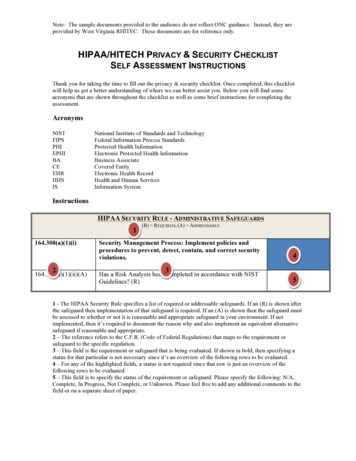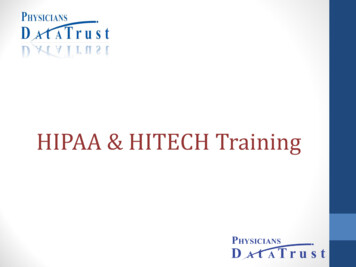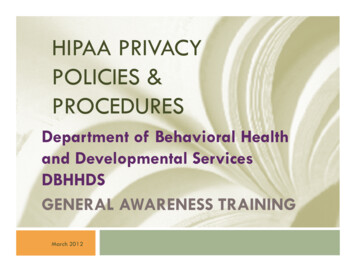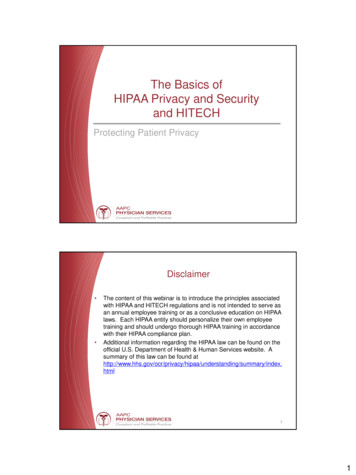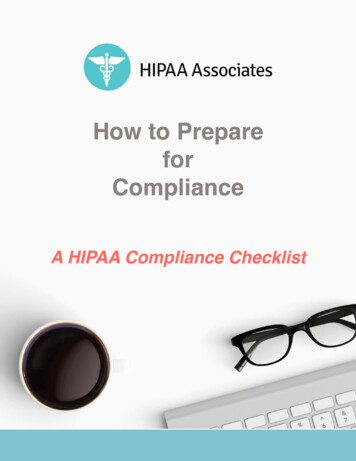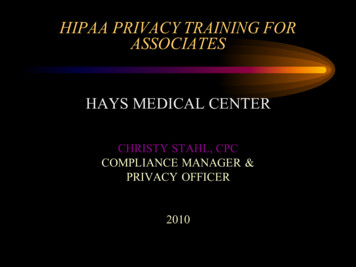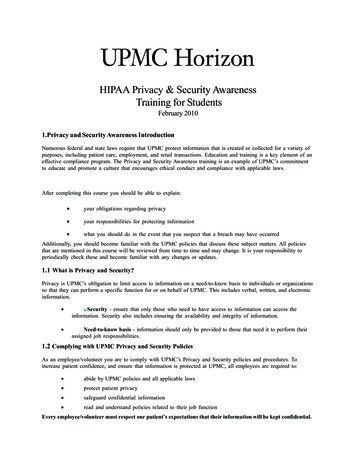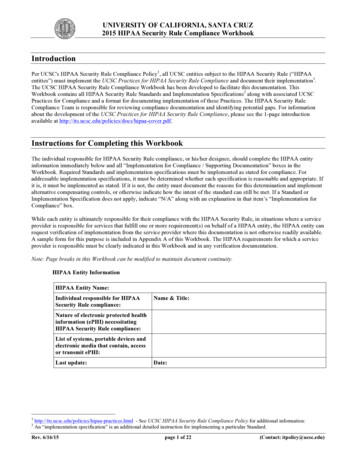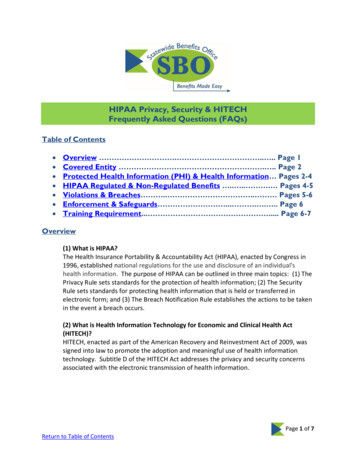
Transcription
HIPAA Privacy, Security & HITECHFrequently Asked Questions (FAQs)Table of Contents Overview . . . Page 1Covered Entity . . Page 2Protected Health Information (PHI) & Health Information Pages 2-4HIPAA Regulated & Non-Regulated Benefits . . . Pages 4-5Violations & Breaches . . Pages 5-6Enforcement & Safeguards . . . . Page 6Training Requirement. . Page 6-7Overview(1) What is HIPAA?The Health Insurance Portability & Accountability Act (HIPAA), enacted by Congress in1996, established national regulations for the use and disclosure of an individual'shealth information. The purpose of HIPAA can be outlined in three main topics: (1) ThePrivacy Rule sets standards for the protection of health information; (2) The SecurityRule sets standards for protecting health information that is held or transferred inelectronic form; and (3) The Breach Notification Rule establishes the actions to be takenin the event a breach occurs.(2) What is Health Information Technology for Economic and Clinical Health Act(HITECH)?HITECH, enacted as part of the American Recovery and Reinvestment Act of 2009, wassigned into law to promote the adoption and meaningful use of health informationtechnology. Subtitle D of the HITECH Act addresses the privacy and security concernsassociated with the electronic transmission of health information.Page 1 of 7Return to Table of Contents
Covered Entity(3) Is the State of Delaware considered a covered entity?Yes. The State of Delaware's Group Health Insurance Plan (or GHIP) is considered aCovered Entity, meaning that the workforce of all organizations who participate in theGHIP are subject to HIPAA requirements. The State of Delaware is required by federallaw to provide HIPAA training to all those covered under the organizations, whetherState or participating groups, who are members of the HIPAA workforce, in other words,those who have access to PHI as a part of their job.Protected Health Information (PHI) & Health Information(4) What is Protected Health Information (PHI)?Protected Health Information is information that relates to an individual’s past, present,or future physical or mental health or condition, the provision of health care services orsupplies to the individual, or payment for health care services or supplies to anindividual that identifies the individual or for which there is a reasonable basis to believeit can be used to identify the individual and is transferred or maintained by a CoveredEntity in any form or medium (electronically, orally or written). Protected HealthInformation includes many common identifiers such as social security number, name,account number, member identification number, postal address, phone number,picture, and license number. Think of an identifier as information a stranger could useto relate health information to a specific person. Types of PHI someone might handleconsist of information related to eligibility, enrollment, claims, claims appeals, reportsfrom third-party administrators or other vendors, Explanation of Benefits (or EOBs), andmedical providers’ bills. If the PHI is maintained, stored or transmitted electronically, itis referred to as Electronic Protected Health Information (or ePHI).(5) What is Health Information?Health information means any information, including genetic information, whether oralor recorded in any form that:a. Is created or received by a health care provider, health plan, public healthauthority, employer, life insurer, school or university or health careclearinghouse (health care clearinghouses process healthcare transactions onbehalf of providers and plans); andb. Relates to the past, present or future physical or mental health or conditionof an individual; the provisions of health care to an individual; or the past,present or future payment for the provision of health care to an individual.Page 2 of 7Return to Table of Contents
(6) What types of PHI could you handle?Types of PHI someone might handle consist of information related to eligibility,enrollment, claims, claims appeals, reports from third-party administrators or othervendors, Explanation of Benefits (or EOBs), and medical providers’ bills.(7) Can PHI be used by the State of Delaware for discipline, hiring, terminatingemployment, promotions and/or demotions?No. PHI will NOT be used by the State of Delaware for discipline, hiring, terminatingemployment, promotions and/or demotions.(8) How can PHI be used and disclosed?Unless allowed by the Privacy Rule, the Group Health Plan (technically, the staff thatadminister these plans) are required to protect PHI and ONLY use or disclose/releasePHI for the following reasons: To the individual – about the individual.For treatment, payment and health care operations.For legally permissible reasons (such as , for public health reasons, inresponse to a court order or subpoena, to a coroner, medical examiner orfuneral director, etc.).With a signed HIPAA authorization form from the individual.To the federal and/or state Department of Health and Human Services forenforcement reason(s).Human Resources staff can discuss general coverage and eligibility rules withparticipants’ family members – NOT PHI. PHI may not be discussed with anyone outsideof the covered entity except the individual (not even the spouse) without a signedauthorization, unless the individual is present and the individual is given an opportunityto object and does not. The other exception is in the case of an emergency where theindividual is incapacitated.As a covered entity, the State of Delaware may also release PHI without anauthorization for certain reasons such as: For public health reasons (i.e., disease outbreaks, etc.).Individual may be the victim of abuse, neglect or domestic violence.In response to a court order or subpoena.To the coroner or medical examiner.To avert a serious threat to health or safety.To comply with Workers’ Compensation laws.Page 3 of 7Return to Table of Contents
(9) What is the HIPAA Security Rule?The Security Rule only covers ePHI that is maintained, stored or transmittedelectronically. Examples include: PHI sent/received via email PHI stored in computers, networks and servers PHI stored on portable electronic media (CDs, disks and tapes)The Security Rule protects against any reasonably anticipated threats to the security orintegrity of ePHI. There are three categories of safeguards that are specified under therule – administrative, physical and technical. The administrative safeguards include riskanalysis and management, training programs, handling of security incidents andsanctions, account access and management and disaster recovery planning. Thephysical safeguards include the development of a security plan for the location, limitingaccess to offices and professional spaces based on job needs, visitor controls,workstation use and security and disposal or re-use of hardware and media. Thetechnical safeguards include system access controls, protection and monitoring, dataintegrity, audit controls and data encryption and decryption.HIPAA Regulated & Non-Regulated Benefits(10) What benefits does HIPAA regulate?Benefit programs sponsored by the State of Delaware that are HIPAA regulated include: Group Health PlanHealth Reimbursement AccountPrescription PlanDental PlanEmployee Assistance ProgramDelaWELLVision PlanHealth Care Flexible Spending AccountCOBRA(11) What benefits are not HIPAA regulated?Although this information is confidential, HIPAA does not cover: Group Universal Life and Accidental Death & DismembermentWorkers’ CompensationShort Term DisabilityLong Term DisabilityDependent Care Flexible Spending AccountSupplemental BenefitsDeferred CompensationPension PlanPage 4 of 7Return to Table of Contents
(12) Are employment records HIPAA regulated?No. Although employment records held by the State of Delaware as an employer areconfidential, they are not subject to HIPAA. Examples of employment records include: FMLA requestsAmericans with Disabilities (ADA) recordsWorkers’ Compensation recordsOSHA reportsDisability recordsSick leave requests or justificationsReturn-to-Work dataDrug screening results/alcohol and drug free workplace dataFitness for duty examsViolations & Breaches(13) What are the penalties for HIPAA violations?There is a tiered penalty structure for violations based on the intent behind the violationand can reach up to 1.5 million per year per standard or higher. Penalties aremandatory in situations involving “willful neglect” and a formal investigation is required.Covered entities are liable for their employees’ actions and employees may be subjectto criminal charges.(14) What does willful neglect mean?“Willful neglect" essentially means "being clueless and/or cavalier”. Here are someexamples: You send an email containing PHI unsecurely.You have no demonstrable evidence that you are requiring HIPAA training asrequired by the HIPAA regulations.You have no plan to show how you are working on full HIPAA compliance,despite the fact that you are aware that you are not in full compliance at themoment.Your employees have their passwords on "sticky notes" that are readilyvisible.Employees are throwing away papers containing PHI rather than shreddingthem.(15) What happens if a breach occurs?The “Complaint Form Regarding Handing of Protected Health Information” is located onthe SBO website under “HIPAA” and contains instructions for completion andsubmission. If a HIPAA breach is detected, the Statewide Benefits Office (SBO) needs tobe notified immediately. SBO will then determine if notification is necessary and whoPage 5 of 7Return to Table of Contents
must be contacted. If notification is required, individuals will receive a letter within 60days of the discovery of the HIPAA breach.If you know or believe a HIPAA breach has occurred, notify SBO immediately.Enforcement & Safeguards(16) How can you protect PHI and enforce the HIPAA regulations? Do NOT share your password with anyone!Lock file cabinets that contain sensitive and confidential information.Think before you click “send.”Use secure email (EGRESS Switch) when transmitting PHI.Keep it “quiet.” Share PHI on a need to know basis only.Don’t store PHI on laptops, but if you do, ensure the laptop is encrypted toavoid breaches.Don’t access emails or documents containing PHI from mobile devices.Shred trash containing PHI instead of throwing it away.Ensure that electronic media containing PHI is erased/sanitized before reuse.(17) What electronic safeguards are in place that impact your daily operations?Your workstation security includes: Unique user IDs.Complex passwords that age at regular intervals.Sessions timing out due to inactivity.Account lockouts due to failed login attempts.Access to ePHI according to job class.Limited access to the internet.Limited access to laptops and portable devices.Limited access to remote connections.DTI monitoring of your activity online.Training Requirement(18) Who is required to complete SBO’s HIPAA Training for Members of the HIPAAWorkforce?The State of Delaware’s Group Health Insurance Plan (GHIP) is considered a coveredentity, meaning that the workforce of all organizations who participate in the GHIP aresubject to Health Insurance Portability & Accountability Act (HIPAA) requirements. TheState of Delaware is required by federal law to provide HIPAA training to all thosecovered under the organizations who are members of the HIPAA workforce, in otherwords, those who have access to Protected Health Information (PHI) as a part of theirjob. This training is intended to satisfy the U.S. Department of Health & Human ServicesPage 6 of 7Return to Table of Contents
(HHS) requirement for HIPAA training and is designed specifically for members of theHIPAA workforce, including employees and individuals with access to HR, benefitsand/or payroll data as part of their job-related tasks, as well as supervisors andmanagers. Employees and individuals who fall within these categories are required bythe State of Delaware to complete the SBO “HIPAA Training for Members of the HIPAAWorkforce” online course every two years to ensure they understand their role in theproper use and distribution of PHI.Please note: HIPAA training courses (online or in-person sponsored by organizationsother than SBO will not satisfy this requirement). This training does not apply toemployees or individuals without access to HR, benefits and/or payroll data as part oftheir job-related tasks. Any change to the federal HIPAA regulations and/or change inour HIPAA policies and procedures and/or the training course content may require anindividual to complete an updated version of the online course prior to their two-yeartimeframe. They will receive notification if this occurs.Access the HIPAA Training at de.gov/statewidebenefits.Page 7 of 7Return to Table of Contents
The Health Insurance Portability & Accountability Act (HIPAA), enacted by Congress in 1996, established national regulations for the use and disclosure of an individual's health information. The purpose of HIPAA can be outlined in three main topics: (1) The . Please note: HIPAA training courses (online or in-person sponsored by organizations .
